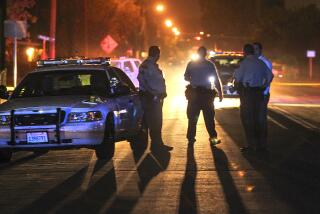Justice in the DNA
- Share via
Civil libertarians have a natural — and healthy — impulse to question scientific advancements in crime control. But concerns about so-called familial searching are exaggerated.
As The Times reported recently, California is a leader in making use of familial searching: the tracing of a criminal suspect through a relative’s DNA. The best-known example of its use was the apprehension of Lonnie David Franklin Jr., the alleged “Grim Sleeper” serial killer. Franklin was identified because DNA he left at a crime scene partially matched that of his son, a convicted criminal whose DNA was stored in a state database.
Was it unfair to capitalize on the fact that the son’s DNA happened to be in the database? Despite the obvious advantages, some civil libertarians are wary of the technique. One objection is that familial searches put an entire family under scrutiny, including innocent relatives. But that is no different from police questioning all the occupants of a house where a crime has been committed. Another concern is that DNA databases contain a disproportionate number of racial minorities. That’s a real problem — as is the disproportionate number of minorities in prison populations generally — but denying the police useful evidence in specific cases is no remedy for that broader problem. Finally, some argue that familial searching might put people whose DNA partially matches that found at a crime in the position of being pressured by police to incriminate a relative. That’s true, but relatives have never been off-limits to a police investigation.
An ACLU lawyer raised another concern: that as familial searching becomes more common, officials might skirt regulations designed to prevent it from being overused in trivial cases. But the specter of unnecessary assembly-line DNA searches is implausible. The state has several procedures to prevent the casual or unjustified testing of DNA, including a screening committee comprising law enforcement and forensic experts. Also, given the cost of the process — $20,000 — the state limits the use of the technique to homicide and sexual assault.
Familial searching raises no more moral and privacy questions than the use of fingerprint information. If anything, the procedures seem too restrictive — why not extend the technique to other violent crimes, as some officials seem willing to do? — but no one can say that privacy concerns are being slighted. The weightier question is whether familial searching can aid in the apprehension of criminals. That has been demonstrated beyond all doubt.
More to Read
A cure for the common opinion
Get thought-provoking perspectives with our weekly newsletter.
You may occasionally receive promotional content from the Los Angeles Times.









